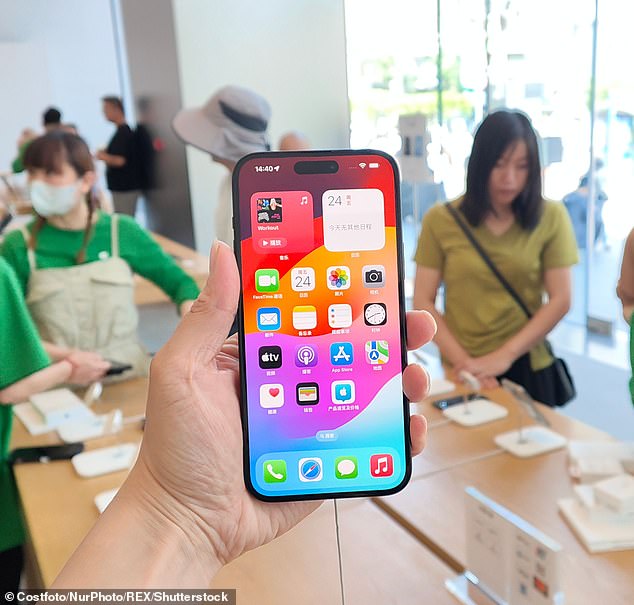Apple’s prices are set to skyrocket to offset President Donald Trump’s tariffs, making the pricey iPhone even more expensive.
Wedbush Securities analyst Dan Ives has warned that the popular smartphones could reach $3,500 each, noting that building them in China is the only way to keep them affordable.
The increase would put the iPhone on par with Apple’s Vision Pro headset that flopped because of its hefty price tag.
Trump slapped a 54 percent tariff on all Chinese goods imported into the US on Wednesday. Almost all iPhones are assembled in China.
‘For US consumers, the reality of a $1,000 iPhone being one of the best-made consumer products on the planet would disappear,’ said Ives.
‘It speaks to our point that if consumers want a $3,500 iPhone, we should make them in New Jersey or Texas or another state….the concept of making iPhones in the US is a non-starter in our view at $1,000.’
Apple had announced a $500 billion investment in the US back in February, in an effort to keep its prices down.
However, Ives said that ‘is it would take three years and $30 billion dollars in our estimation to move even 10 percent of its supply chain from Asia to the US with major disruption in the process.’

Apple’s prices are set to skyrocket to offset President Donald Trump’s tariffs, making the pricey iPhone even more expensive
Trump imposed a series of sweeping tariffs on countries around the world that could drastically alter the landscape of global trade, and consumer goods like iPhones could be among the hardest hit.
‘Making Apple products and iPhones in the US sounds great behind the microphones in the 202 area code…but in reality they are a fantasy tale that in our view will never happen…..and if they are produced in the US will be 2x-3x more expensive,’ Ives said in a Thursday email.
‘It’s the reality of the US labor market, developing and building a tech factory, chips being in Asia, and having the right skilled workers and engineers to operate a complex manufacturing arm such as Apple.
‘Apple can produce certain products in the US like high-end Macs and some other hardware components…but these tariffs in their current form are a shut-off valve for US consumer sales or risk prices going up to levels that are hard to digest.’
Apple sells more than 220 million iPhones a year; its biggest markets include the US, China and Europe.
The cheapest iPhone 16 model has a sticker price of $799, but Ives’ analysis predicts the upcoming smartphone could sell for more than double when it hits shelves later this fall.
Trump imposed tariffs on a wide range of Chinese imports in his first term as president to pressure US companies to bring manufacturing either back home or to nearby countries such as Mexico, but Apple secured exemptions or waivers for several products. This time, CEO Tim Cook has not yet granted any exemptions.
Barton Crockett, analyst at Rosenblatt Securities, said in a note: ‘This whole China tariff thing is playing out right now completely contrary to our expectation that American icon Apple would be kid-gloved, like last time.’

Trump slapped a 54 percent tariff on all Chinese goods imported into the US on Wednesday. Almost all iPhones are assembled in China
China is expected to retaliate by imposing an additional 34 per cent tariffs on all US imports.
Beijing announced the measure today, the most serious escalation in a trade war with Trump that has fed fears of a recession and triggered a global stock market rout.
The new tariff, which comes into effect on April 10, matches the rate of the ‘reciprocal’ 34 percent levy imposed by Donald Trump this week.
The levies are in addition to the existing tariffs already imposed on US goods.
US exports to China totalled $143.5 billion last year, according to Office of the US Trade Representative data. Oilseeds and grains, including soybeans, machinery and aerospace products were America’s top exports to the country.
The US imported $438.9 billion worth of goods from China last year, with top imports including electrical and electronic equipment, machinery, toys, and plastics.
Beijing’s commerce ministry also said it will impose more export controls on rare earths, which are materials used in high-tech products such as computer chips and electric vehicle batteries.
China added 11 entities to the ‘unreliable entity’ list, which allows Beijing to take punitive actions against foreign entities. The country also filed a lawsuit with the World Trade Organization (WTO) over sweeping US tariffs imposed on its exports.
‘For all imported goods originating from the US, an additional tariff of 34 per cent on top of the current applicable tariff rate will be imposed,’ China’s Finance Ministry said today.
Beijing’s Commerce Ministry also imposed export controls on seven rare earth elements – including samarium, gadolinium, terbium, dysprosium, lutetium, scandium and yttrium – to the US, effective April 4.
‘The purpose of the Chinese government’s implementation of export controls on relevant items in accordance with the law is to better safeguard national security and interests, and to fulfill international obligations such as non-proliferation,’ the Commerce Ministry said in a statement.
The Commerce Ministry added: ‘China has filed a lawsuit under the WTO dispute settlement mechanism.’
This article was originally published by a www.dailymail.co.uk . Read the Original article here. .

